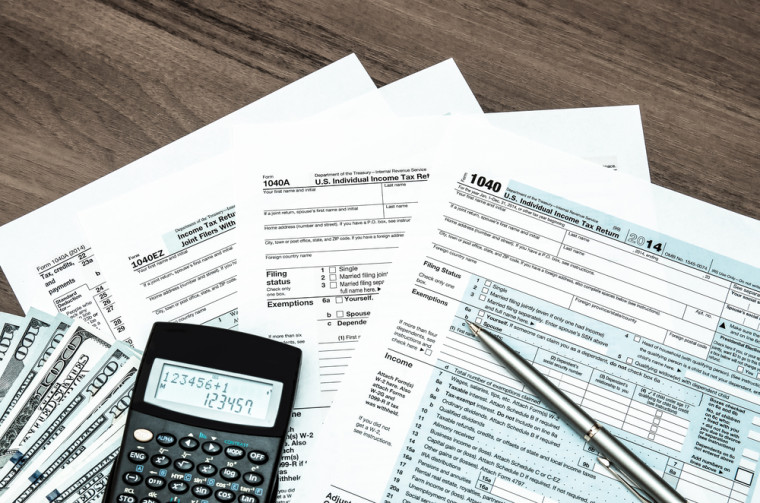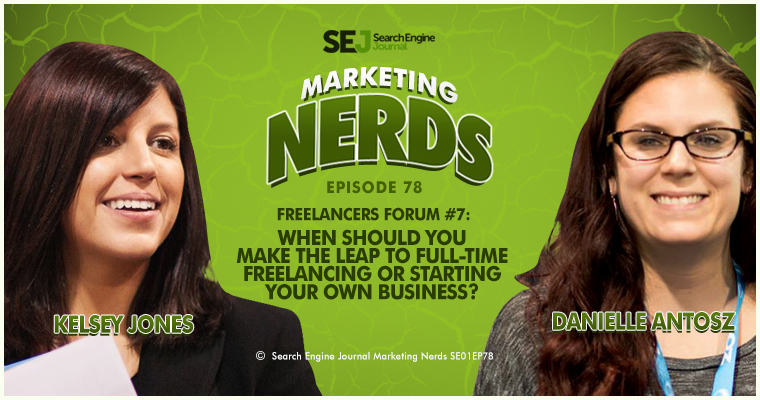Podcast: Download
Subscribe: Apple Podcast Google Podcasts Spotify
Visit our Marketing Nerds archive to listen to other Marketing Nerds podcasts!
This post is sponsored by SEJ Summit “A Day of Keynotes”—a unique conference experience tailored for SEOs, by SEOs. Events will take place in Santa Monica, Chicago, and New York City throughout 2016. Use discount code SEJNERD to save $50 on your ticket.
In this week’s episode of Marketing Nerds, Kelsey Jones and Danielle Antosz talk about their experiences in taking the leap to full-time freelancing. They also shared the bookkeeping and invoicing tools that work for them, and discuss when it is time to quit your full-time job.
Editor’s Note: To learn more about how to get started in freelancing, listen to this Marketing Nerds episode with Kelsey Jones and Danielle Antosz.

Here are a few transcribed excerpts from our discussion, but make sure to listen to the podcast to hear everything:
When to Make the Leap to Full-Time Freelancing
There’s almost never a perfect time. You’re probably never going to have the perfect, “Okay. I have ten grand in the bank account, let’s do this.” If you have ten grand in your bank account, good for you. But it is hard to gauge that perfect timing. You want to have a little bit of a cushion, right?
You don’t want to be like, “Well, my rent’s due next month, but I’m just going to quit my job until it will be okay.”
There’s a balance. Otherwise, you’re working your full-time job 40 hours a week, plus a commute, which can be up to 10 hours a week for some people, plus trying to build your freelance up to a full-time job on nights and weekends. That can be really overwhelming.
On Having a Backup Plan
I don’t think there’s anything wrong with having a backup plan. I’ve heard people say, “Well, if you have a backup plan, you’re setting yourself up for failure.” I don’t agree with that at all. It’s what gave me the strength to quit my full-time job.
What’s the worst-case scenario?
The worst-case scenario, if I go full-time freelance and I fail, what’s the worst possible thing that could happen? I’ll have to pick up a bartending job to pay my bills. Not ideal, but not the end of the world.
For me, thinking about what the worst-case scenario is and facing it and going, “Okay. I can handle that,” that’s what gave me the strength to quit.
Survival Skills to Succeed
To be able to succeed, you have to be able to do what it takes to survive.
You have to know that when the going gets tough, you have to be willing to work at Panera or Starbucks or get another full-time job for another year. If you are immediately resistant to that idea but you’re still scared, then honestly, I don’t know if it’s going to work for you. I feel like going out on your own; you have to have a level of scrappiness, for lack of a better word.
That might mean getting a roommate. It might mean trading in your car for a car with a lower payment. It might mean selling your car and getting a $2,000 car. It depends on what it looks like for you.
Talking About Taxes
Taxes are one of the scariest things about going freelance. I use FreshBooks. I think I pay 20 bucks a month. I like them for two reasons.
First of all, I can bill clients through them. They have a way where you essentially get an electronic check from your client. They pay through Paypal, but you only pay 50 cents instead of the percentage that you would normally pay. The money I save doing that pays for FreshBooks each and every month. I think it’s very, very much worth it.
It makes it easy to do invoices. You can track your expenses, which is a big deal, because if you were going to end up with a shoe box at the end of the year and try to sort through that, you’re probably going to make a mistake and it’s just going to be absolutely overwhelming. I have the app on my phone, and anytime I buy something, I just put it in and I don’t have to worry about it come tax time.
When I filed my taxes the first time, I had tried to find a CPA. You have to pay estimated taxes when you’re a freelancer, which is just a guesstimate. But, keep in mind, I’m not a tax professional.
He helped me figure out what I needed to be paying for estimated taxes, but I didn’t go with him because he didn’t seem to use computers and that weirded me out. I ended up going to H&R Block.
I think, this year, I’m going to use TurboTax. I’ve used them to do my taxes before because I worked a traditional job. I didn’t have kids. I didn’t have any weird write-offs. I didn’t have investments. It is super easy to use.
Remember, you can write off a part of your rent or your mortgage if you work from home based on certain parameters. I think TurboTax actually will walk you through that as well. You can write off a certain portion of your utility bills, a certain portion of your electricity bill. If you buy a new computer that’s mostly for work, you can write off a certain portion of that. There’s a lot of write-offs.
I will say that paying someone to help you, whether that’s to do your taxes every year or to set you up for estimated payments, et cetera, is worth it.
One other thing to consider too is a certain amount of your income is taxable and a certain amount of it is not. If you have an IRA, a retirement account, you can move more of your money to keep yourself in a lower tax bracket. You can bump money from what you’ve earned into your retirement account, which generally will make it non-taxable. That can save you a ton of money on taxes.
Setting up a Retirement Account
If you haven’t started contributing, please start. It’s important even if you’re a freelancer or a consultant and you think you’ll work forever. Start a retirement account.
Don’t Expand Your Expenses With Your Income
So many people expand their expenses with their income. You don’t have to do that. I know, as you make more money, you might get a nicer car that’s more reliable, but you don’t have to. Think about that too when you’re making a budget and planning and trying to decide what you want to do.
It’s your money. I think what I am trying to say is don’t be scared of it. Don’t ignore what you are spending and don’t spend money trying to prove something.
Other Tools and Resources Mentioned in This Episode
- QuickBooks
- GoDaddy Bookkeeping
- 17Hats
- IRS Distribution Worksheet
To listen to this Marketing Nerds podcast with Kelsey Jones & Danielle Antosz:
- Download and listen to the full episode at the top of this post
- Subscribe via iTunes
- Sign up on IFTTT to receive an email whenever the Marketing Nerds podcast RSS feed has a new episode
- Listen on Stitcher
Think you have what it takes to be a Marketing Nerd? If so, message Kelsey Jones on Twitter, or email her at kelsey [at] searchenginejournal.com.
This post is sponsored by SEJ Summit “A Day of Keynotes”—a unique conference experience tailored for SEOs, by SEOs. Events will take place in Santa Monica, Chicago, and New York City throughout 2016. Use discount code SEJNERD to save $50 on your ticket.
Visit our Marketing Nerds archive to listen to other Marketing Nerds podcasts!
Image Credits
Featured Image: Image by Paulo Bobita
In-post Photo: RomanR/Shutterstock.com





![AI Overviews: We Reverse-Engineered Them So You Don't Have To [+ What You Need To Do Next]](https://www.searchenginejournal.com/wp-content/uploads/2025/04/sidebar1x-455.png)